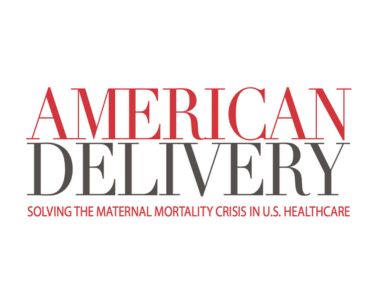More women—especially women of color—die in childbirth in the United States than any other wealthy nation, according to the World Health Organization and Centers for Disease Control and Prevention.

Amid this growing maternal health crisis, American Delivery, a new documentary film premiering at the Cleveland International Film Festival on April 6, tells the stories of pregnant women finding their voices and autonomy, nurses providing support during childbirth and the postpartum period, and of hospital leaders making change in their communities. Case Western Reserve University’s Frances Payne Bolton School of Nursing played a key role in the project, as several alumni and Joyce Fitzpatrick, the Elizabeth Brooks Ford Professor of Nursing, acted as advisors to the film, sharing their decades of experience guiding nurses to be catalysts for change.

“This film is about possibilities for change, hope for the future of women’s health in America and globally, and importantly, for the power of nurses to make these changes,” said Fitzpatrick.
“American Delivery highlights the foundational role of nurses and nurse-midwives in changing maternal health outcomes. Women in America deserve better care. It’s that simple. And nurses and nurse-midwives, as leaders in providing maternal health care during the birthing experience, can affect change,” Fitzpatrick added.
According to a recent March of Dimes report, the preterm birth rate among Black and American Indian/Alaskan Native women in the U.S. is 54% higher than other women—with their babies 2.3 times more likely to die compared to white women.
Directed by Carolyn Jones and produced by Lisa Frank, American Delivery was the brainchild of the Marian K. Shaughnessy Nurse Leadership Academy at Case Western Reserve’s nursing school. The world premier celebration of American Delivery at the Cleveland International Film Festival will be April 6-7, 2024. Watch the trailer for the film and purchase tickets to the premiere online.
Read on to hear more from Fitzpatrick about what Case Western Reserve is doing to address the maternal health crisis.
- What role do nurses play in addressing the maternal health crisis in America?
Nurses provide the majority of healthcare in the world, serving individuals, families and communities in a wide range of roles, from primary health care provider to nurse-midwife to chief nurse executives in major health care systems. Our focus as a discipline is on health and wellness. Women want a voice in their health care, and especially in the experiences during childbearing and birth. Women in the U.S. deserve better care, especially at a time when they are experiencing a maternal health crisis.
- What are nurses doing today to address the infant mortality crisis?
Nurses locally and nationally are driving the agenda for better healthcare for all, and specifically for decreasing maternal and infant mortality. At the legislative level, nurses are committed to changing policies to provide full practice authority for Advanced Practice Registered Nurses (APRNs), including nurse-midwives. APRNs are educated and prepared clinically to address the challenges of infant mortality through graduate programs provided by the School of Nursing and other nursing schools.
- How does CWRU’s interprofessional approach to health play into the maternal health crisis?
Healthcare delivery requires interprofessional teams working together to provide the highest quality care at all levels—for women, their families and for communities. We must work together to address the maternal health crisis in the U.S. We can learn much from our colleagues in other countries where nurse-midwives provide much of the care for women, and are supported through a system that relies on interprofessional practice. In the U.S. we have far too few nurse midwives available as team members.
- How is the School of Nursing preparing the nurses of tomorrow to handle these issues?
The School of Nursing has a strong nurse midwifery program, and also prepares family nurse practitioners to provide care. Additionally, maternal and infant health care is an important part of our basic professional degree programs. Nursing students are prepared to care for individuals, families and communities at all levels. And through the nurse leadership academy, we also are preparing nurse leaders to deliver care for all from the bedside to the boardroom.
Through the American Delivery film, we want to empower our students to take the lead in making changes throughout health care for women, families and communities that lead all to better health outcomes in the U.S. and globally.
- What inspires you as a nurse to continue pushing for change in the profession?
I believe passionately that nurses have the requisite knowledge, skills and commitment to advance global health, through holistic care provided to one person, one family, one community and the entire world.

